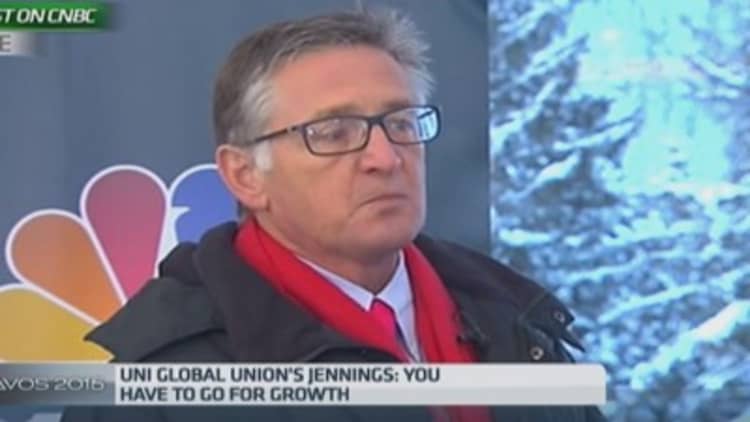
Advanced economies like the U.S. and the U.K. might be experiencing a promising uptick in their economies but a clutch of new figures have highlighted the danger of the inequality of unemployment around the world.
The World Economic Forum (WEF) - meeting in Davos, Switzerland this week - has a soul aim of "improving the state of the world." In a new discussion paper Monday, the group underlined its belief that rising income inequality was damaging future economic well-being and said there had been little in the way of concrete policy guidance to combat the problem. Also on Monday, international development charity Oxfam warned that wealth inequality is "rising fast" and estimated that the combined wealth of the world's richest 1 percent could overtake that of the remaining 99 percent by 2016.
Meanwhile, global unemployment is set to rise in the next five years, according to a new report from the International Labour Organization (ILO) on Tuesday, which stated that joblessness was forecast to increase by 3 million in 2015. The subject was also central to President Barack Obama's State of the Union speech Tuesday night, with plans from the President on trying to slow the widening gap between the richest and poorest in America.
"Working people did not cause this financial crisis, they were the victims, they paid for it," Philip Jennings, the general secretary of labor union UNI Global, told CNBC at Davos.
UNI Global Union is based in Nyon, Switzerland represents more than 20 million workers from over 900 trade unions, according to its website. It specializes in the skills and services sectors. Jennings called on the Davos attendees to look at the humanitarian consequences of what is happening in these countries with high unemployment. He urged policymakers to "go for growth" and create opportunities for the youth, better infrastructure and more investment.
Unemployment is particularly acute in the euro zone bloc which is struggling to recover from a sovereign debt crisis in 2011. The unemployment rate in the region still stands at 11.5 percent, while youth unemployment in nations like Greece and Spain has peaked above 50 percent in the last few years.
The European Central Bank (ECB) is expected to pump yet more stimulus into the euro zone over the coming months and President Mario Draghi has previously spoken for the need to tackle unemployment as well as its mandate to keep inflation at desired levels.

Despite vast expansion of its balance sheet, economists like Claus Vistesen, the chief euro zone economist at Pantheon Macroeconomics, believe it'll take some time for the results to show in full. He told CNBC via telephone that quantitative easing (QE) in the euro zone would have a "glacial" lag on unemployment which could only truly manifest itself in years to come.
UNI Global's Jennings lambasted the current austerity measures in the euro zone and said that Europe was currently like a car that was "stuck in neutral."
Valdis Dombrovskis, the vice-president for Euro and Social Dialogue at the European Commission said it was "misguided" that less austerity and more spending would naturally lead to better growth. He countered Jenning's claims, saying that indebted countries needed to ensure financial stability before relaxing any austerity measures, or else there would be trouble
He added that there was flexibility for euro zone countries with their budgets but warned that there would be no "fiscal slippage."






